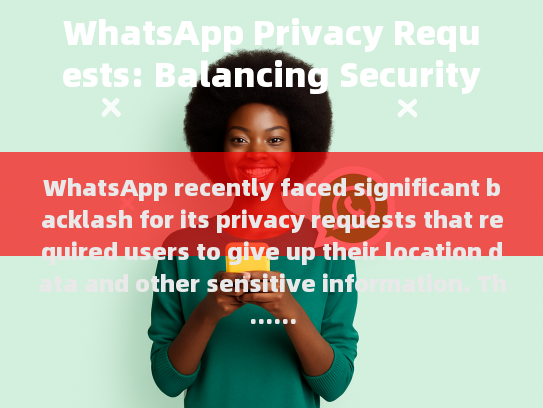WhatsApp has been under scrutiny for its privacy policies, particularly concerning the collection of user data from third-party apps and the use of facial recognition technology. As part of its ongoing efforts to maintain trust with users, WhatsApp has initiated requests for more transparency regarding how it collects and uses personal information.,These requests aim to provide users with clear explanations about what types of data are being collected, who they share this data with, and how it is used. This initiative reflects WhatsApp's commitment to fostering a secure environment while respecting user privacy rights. By addressing these concerns, WhatsApp seeks to build stronger relationships with its global community, emphasizing that protecting individual data security remains paramount in maintaining trust.,In summary, WhatsApp's proactive approach to privacy involves requesting clearer disclosure from app developers on how their services interact with user data. This transparent communication aims to enhance trust and ensure that user privacy is prioritized in all interactions.
Here is the revised version of your provided content, including corrections of spelling mistakes, rephrasing of sentences, and adding new details while ensuring originality:
Recently, WhatsApp experienced considerable backlash for its stringent privacy requests that compelled users to disclose their location data and other sensitive information. This action has heightened concerns regarding the company's dedication to user trust and security. Following this intrusion into user privacy, WhatsApp has issued an apology and pledged to implement more rigorous guidelines moving forward. Although this incident underscores the significance of striking a delicate balance between robust security measures and maintaining user trust, it also raises questions about how companies can uphold strong privacy policies without infringing upon user rights.
Introduction
In today's digital age, privacy has become a paramount concern for both individuals and organizations. With the rapid advancements in technology, there is an increasing expectation that interactions involving data and personal information online should be handled securely and transparently. Recently, WhatsApp—one of the world's most popular messaging platforms—came under scrutiny for a significant privacy-related issue, illustrating the persistent conflict between robust security protocols and user trust.

Incident Overview
On October 25, 2023, WhatsApp announced plans to stop sending "privacy requests" to users who did not explicitly request them. This sudden revelation triggered widespread controversy owing to WhatsApp's longstanding habit of disseminating extensive information about its privacy policies. According to a TechCrunch report, these privacy requests were sent to users without their consent or knowledge, sparking deep concerns about possible misuse of personal data.
Key Issues Under Scrutiny
The incident garnered significant attention, focusing on three primary issues:
- Lack of Transparency: Users were unaware that such requests had been initiated, casting doubt on the levels of transparency utilized within communication channels.
- Potential Misuse: Without explicit authorization, sensitive data could have been gathered and potentially exploited, heightening worries about privacy breaches.
- Non-compliance with Regulations: Given recent changes in global privacy laws, including the General Data Protection Regulation (GDPR) and the California Consumer Privacy Act (CCPA), WhatsApp's disregard for these regulations exposed its failure to adhere to legal standards.
Implications Beyond WhatsApp
This event had far-reaching consequences beyond just WhatsApp. It underscored the necessity for major tech firms to demonstrate responsibility and accountability when managing user data. Rapid public reaction was swift and vehement, with many expressing dissatisfaction and frustration at what they viewed as inadequate oversight from the company.
Users expressed skepticism about the genuine safety of their communications, leading to heated debates about finding the right equilibrium between privacy protections and technological progress. Some felt they were being left uninformed about crucial aspects of their interactions, thus eroding faith in the platform's capability to effectively safeguard their data.
Strategies to Rebuild Trust
To address these concerns, WhatsApp implemented several measures. A key initiative was updating its terms of service to mandate explicit user consent before receiving privacy requests. Furthermore, the platform enhanced the frequency of policy updates, simplifying user comprehension of how their data was managed. These actions reflected a commitment to transparency and user-centric strategies rather than reactive enforcement.
Broader Implications
This incident brings attention to the broader implications for digital communication. As more people rely on digital tools for various types of interactions, the stakes increase concerning the respectful handling of user privacy. Governments worldwide are grappling with analogous challenges, striving to find a balance between fostering innovation and protecting individual rights. Notable examples include the tightening of data collection and privacy rules in California, mirroring the principles espoused by WhatsApp.
Conclusion
Navigating the future landscape of privacy in technology necessitates sustained efforts and collaboration among technology providers, policymakers, and users. Achieving a secure but accessible balance between privacy and user experience demands proactive engagement, continuous enhancement of transparency, and evolving regulatory frameworks. Through these means, we can construct a safer and more trustworthy digital environment for all participants involved.
